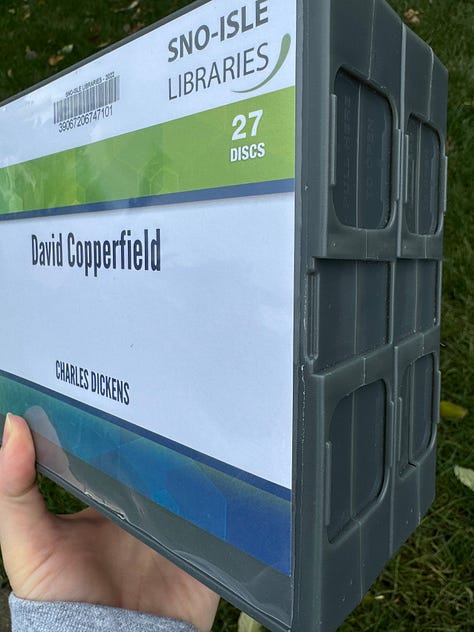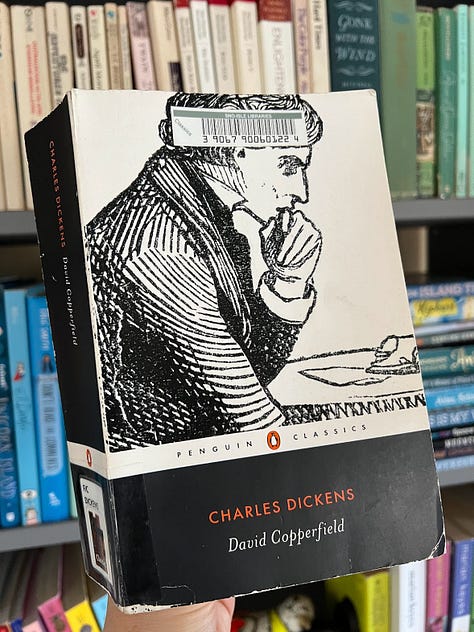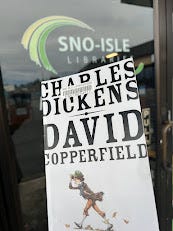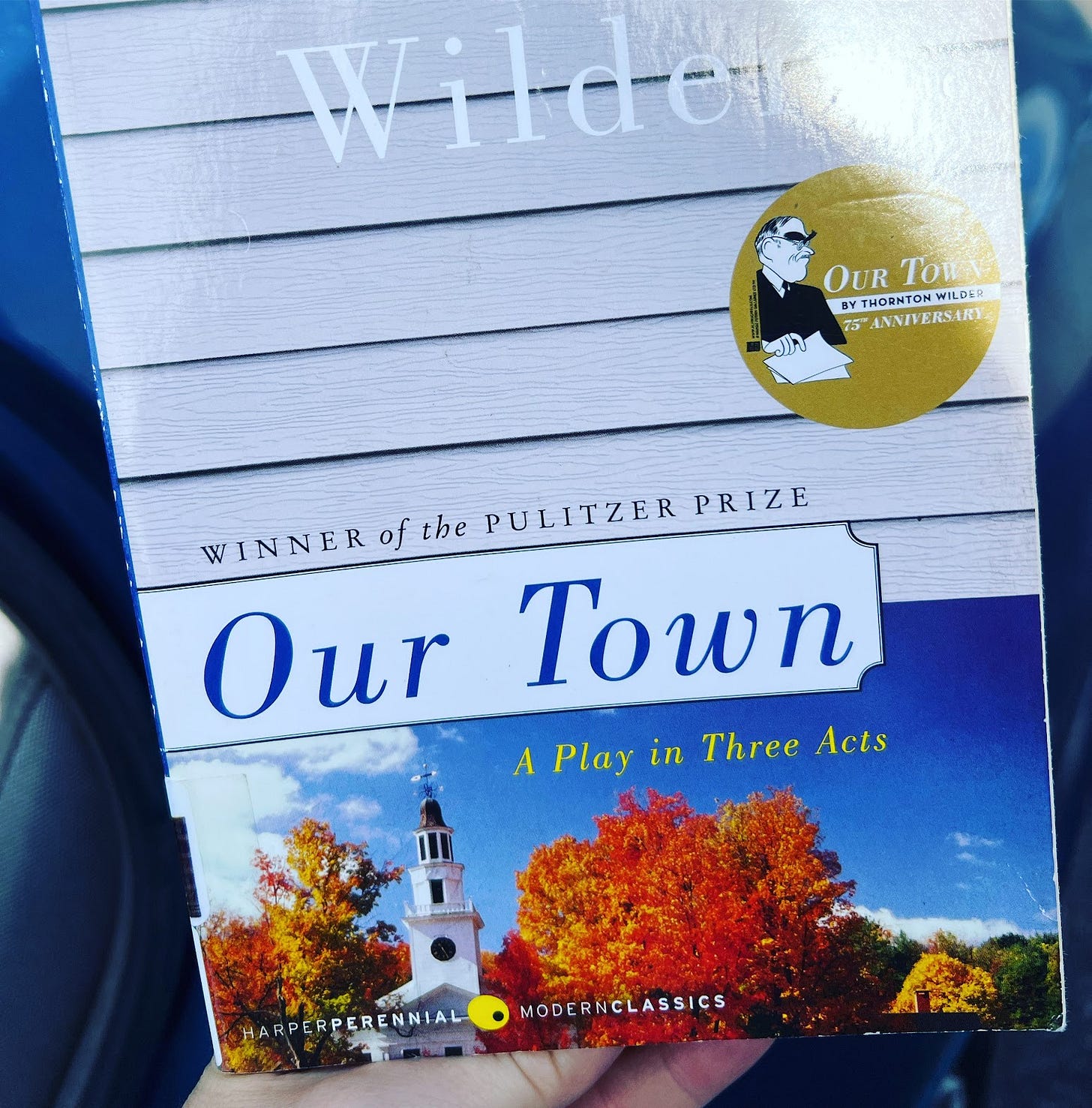DEMON and DAVID and HEROINE
This is full of spoilers. If you haven't read DEMON COPPERHEAD or DAVID COPPERFIELD yet, just click the heart and come back after you've finished.
Books to Read: DEMON COPPERHEAD and DAVID COPPERFIELD by Barbara Kingsolver and Charles Dickens
Yes, I’m very late to this party.
I recently discovered that I’m not a fan of Charles Dickens.
This makes me a bit sad. Shouldn’t all readers love Dickens?
This discovery started a few years ago when Ann Patchett told me (well, she told me via an Instagram post - I don’t know her personally. Unfortunately) to read DAVD COPPERFIELD before Barbara Kingsolver’s DEMON COPPERHEAD comes out. Also, while I’m at it I should read OUR TOWN before her book TOM LAKE came out.
I ignored the advice at first. But then I started reading1 TOM LAKE and I had to stop halfway through because it became apparent that I really needed to find a copy of the play OUR TOWN.
I read it. I cried. I finished TOM LAKE. It was indeed enhanced by my OUR TOWN interlude. Ann Patchett, as usual, was right.
Determined not to make the same mistake, I put DAVID COPPERFIELD on hold at the library and told myself I wasn’t allowed to read Barbara Kingsolver’s DEMON COPPERHEAD until I finished the Dickens tome, which is approximately 12,000,000 pages.



After a year, in which I’d cycled through four different library copies of the insufferable book, I finally gave up halfway through the Dickens novel and just read Kingsolver. DEMON COPPERHEAD was amazing of course. Totally deserving of all the accolades and awards (including the Pulitzer). Somehow the 560 pages of DEMON don’t bother me at all.
After reading DEMON, I went back to the library and (yet again) checked out DAVID. I wanted to know how the endings lined up. This is a testament to how great Kingsolver is - only she could make me want to read more Charles Dickens.
The question remains: Does one need to read DAVID to fully appreciate DEMON?
Unfortunately, my answer is yes.
This is a bit of a bummer because DAVID gives away the plot of DEMON.
The moment Demon’s mother I got pregnant, I knew her death was imminent.
I knew Demon’s paternal grandma was waiting in the wings to save the day.
I knew that ‘lil Emmy would run away with Fast Forward.
I knew to immediately love Tommy.
However, all these spoils are worth it just for the ability to appreciate Kingsolver’s brilliant character transformations.
How she took each of these 19th-century British characters and reimagined them to fit into Appalachia in the 1990s was sheer genius.
My favorite was the Micawber family. In the Dickens novel, Mr. Micawber constantly had one foot in the debtor’s prison and one foot at home, convincing his long-suffering wife that his next venture would surely bring them wealth.
In DEMON, one of Mr. Micawber’s money-making schemes is to become a foster parent, raking in the small amount of cash the government provides to help feed and clothe foster kids. Micawber, of course, pockets the money and 10-year-old Demon spends his stint as an underfed Micawber foster kid living in the family’s rotted-out basement.2 There were also pyramid schemes3 and lots of pawning things Mrs. Micawber’s parents gifted the children.
Also, I love that Uriah Heep’s character4 was named “U-Haul” in DEMON. Ha. So perfect. U-Haul got his name because he was in charge of hauling around sports equipment while trying to convince people that he was actually the assistant football coach. U-Haul was just as slippery and sneaky and evil as Uriah, of course.
A 21st-century Dora seems like the hardest to pull off. In the Dickens book, David’s wife Dora is a beautiful and entirely useless girl. She lets her dog walk across the table during dinner parties. Dora can’t cook, add figures, or make one single decision for herself. She considers herself lucky to have the honor of quietly holding her husband’s pens while he writes. Dora begged her husband to think of her as a child so he couldn’t get mad at her for being so dumb. David loved his “child-wife.”
Obviously, that’s not going to fly in a novel set in the late 1990s. You can’t go around calling your girl a “child-wife” in the 21st century. Also, Demon is not as wide-eyed and gullible as David. There’s no way he’d fall in love with someone so stupid. So what is an author to do?
Here comes the opioid epidemic.
In DEMON, Dori is a gorgeous girl who drops out of high school to take care of her father who is dying of cancer. He falls hard for Dori, a tragic figure who lovingly carves out space for Demon in between her father’s treatments, hospice nurse visits, and drug runs. A cancer-eaten father needs lots of pain meds, of course. Dori is an addict just waiting to happen. When her father dies, Dori falls apart. Demon’s already slid down the opioid path from his football injury and now these two broken kids are in a house full of drugs. The house descends into filth and chaos. Demon makes it out. Dori doesn’t.
Kingsolver’s take on the opioid epidemic and its insidious hold on rural America is brilliantly discussed in this novel. The true hero of DEMON COPPERHEAD is the nurse who runs around railing at drug reps and the free-flowing prescriptions coming from lax doctors while simultaneously trying to save every member of her community from their own paths of addiction.
I love that DEMON has a happy ending. After a hundred pages of drug additions, one needs a happy ending, and Kingsolver gives us a super-satisfying one.
Whelp, I’m off to go read HUCK FINN and JAMES now. Authors really need to stop with these re-imaginings. We readers only have so much time.
A place to explore: Appalachia of course, but I haven’t been there…so here is another book to read!
One of the many things you learn when reading DEMON is that people who haven’t lived in Appalachia have no business writing about Appalachia. As a denizen of the Pacific Northwest who hasn’t even visited the eastern ends of Virginia, I have no business saying anything about exploring Appalachia other than the fact that I’m dying to go one day. It sounds gorgeous.
Therefore, I offer yet another book to read.
When I was reading about Demon’s descent into addiction, my mind kept traveling to another book I’d read a few years ago.
HEROINE, by Mindy McGinnis is about Mickey Catalan, a high school catcher. She is desperate for a winning season and the scholarship opportunities that will surely follow. When she gets into a car accident a few months before the season starts she is prescribed opioids. And we all know where the story goes from there: she keeps taking them in order to keep playing ball, and gets addicted. It’s the same story that’s played throughout countless lives, both literary and irl.
Those themes of HEROINE (published in early 2020) are echoed in DEMON (published in 2024). After several years of Dickensian misery, our protagonist Demon Copperhead finally finds a moment of success with football. And then: injury, opioids, addiction.
Both McGinnis and Kingsolver write in such a heartbreaking fashion. The reader is totally with both Mickey and Demon as they make each little decision on their descent down to hell. The writing in both books is SO visceral. It’s hard to read.
It’s even harder to listen to. I did the audio for both of these books and the only time I listen to audio books is on long runs. Let me tell you, listening to the effects of opioid addiction while on a 10 mile run is not a fun experience. I swore I wouldn’t do it after HEROINE, but DEMON was so captivating I couldn’t help it.
Both books shed light on the availability of opioids, the brutal physical realities of trying to quit, and how easily one can slip down the path to addiction. HEROINE highlights how easily early addiction can be to hide, even from a tight-knit circle of friends and a loving family. DEMON highlights the broader issues that manufactured the opioid crisis, especially in Appalachia.
Empathy-inducing tales, these are.
If you buy any of the books mentioned above via the link, thank you! You are supporting me (I get a dollar or two kickback for each purchase), the author, and your local independent bookstore. Happy reading and thanks again.
A lesson to teach: Family interviews
In a 2023 interview for SLATE, Barbara Kingsolver says: “I wanted to tell the bigger story, sort of the whole historical context of how this region has been exploited by big capital for centuries, and how that has shaped the identity of this region and how it has created institutional poverty here.”
Of course this theme develops across the book, but the first time Demon gets a sense of that history, it’s from his middle school teacher. I love Kingsolver so much for giving a teacher that power. This moment in the story feels like such a love letter and acknowledgement to us public school teachers. Thanks Barbara.
Here’s the scene:
Mr. Armstrong has all his seventh-grade students do interviews of old people in their families, to learn about what type of people they came from.
“In Mr. Armstrong’s backgrounds projects, we learned one thing: if you throw a rock in Lee Country, you will hit somebody with a family that’s worked coal.
Almost everybody in our class had great-grandparents that came over from some country to work in the mines…they told stories of all the kids in a family working in a mine underneath the same land that was bought from them. The coal guys came in here, buying up land without mentioning the buried treasure under it. And then all that was left was to work…
The Pa-Paw stories were mostly along the lines of ‘How awesome was that? Us busting our asses?’
Whereas the Ma-Maw stories leaned more towards not awesome: getting your paycheck and fake money that you had to use in the coal company’s stores that charged you double. Breathing black dust all day, coughing up black hunks of lungs all night.”
But that was all in the past, right?
Nope. Mr. Armstrong, the history teacher-hero, brings it home:
“He finally said, ‘didn’t we wonder why there’s nothing else doing around here, in the way of paying work…?’
‘…wouldn’t you think,’ he asked us, ‘the miners wanted a different life for their kids? After all the stories you heard? Don’t you think the mine companies knew that?’
What the companies did, he told us, was put the shut hole on any choice other than going into the mines…these counties got bought up whole: land, hospitals, court houses, schools: company owned. Nobody needed to get all that educated for being a miner so they let the schools go to rot. And they made sure no mills or factories got in the door. Coal owned. To this day, you have to cross a lotta ground to find other work.
‘Not an accident,’ Mr. Armstrong said.
And for once, we believed him. Because down in the dark mess of our little skull closets, some puzzle pieces were clicking together, and our world make some terrible kind of sense. The dads at home drinking beer in their underwear, the moms at the grocery with their SNAP coupons, the army recruits with their shiny buttons come to harvest their jackpot of hopeless futures? God damn.”5
That’s every history teacher’s dream right there: to have students learn something about the past, and then puzzle pieces click together in their “little skull closets” as they realize their own lives are affected by the past.
History matters.
Although I’ve never managed to craft an assignment as powerful as Mr. Armstrong’s, I have before assigned family interviews, wherein my students ask adults in their lives to make their own connections about what we’re learning in school. Here is one such assignment - feel free to adjust the format to fit your content. Here is more coal-mining content, including my trip to the biggest electric coal shovel in the world.
I also had a teacher in 11th grade (And faithful newsletter patron! Hi Matt!) who loaded his US history students on a bus and hauled us off to the local old folks home, wherein we all interviewed old people about their memories of the Great Depression and WWII. I’ll write more about that later.
Happy reading, teaching, and thinking about history! I’ll see you again next Sunday.
Well, listening to TOM LAKE. Meryl Streep narrates it.
This, sadly, happens. In my two decades of working at Title I schools I’ve often become aware of a few of these types of foster “families.” One of my students had to pay her foster family $600 a month for her room/furnishings once she turned eighteen so she could live there through her senior year. Pure evil.
I’m bummed that Mrs. Micawber didn’t become a Lulu Lemon rep. That would have been perfect.
“If you are going to be an eel man, be an eel!”
I’m transcribing this from the audio book, so please know that Kingsolver’s grammar and spelling choices aren’t coming through here




I loved Demon Copperhead and the audio actor who performed it! Learned so much about a part of the country we tend not to learn about. IMO, you can read wikipedia summary of David Copperfield to get the comparative gist. But also, in support of Dickens, it might be fair to note that most of his novels were serialized, so longer than they needed to be.
I LOVED Demon Copperhead. I’m glad you read it!! You are right, the writing is visceral it IS hard to read at times, but those moments of beauty make it worthwhile. :) I’m not sure if I’ll ever read David Copperfield (though you make a compelling case for why one should 😂), but I definitely am going to check out Heroine! Thanks for the rec! And for such a great comparison piece.